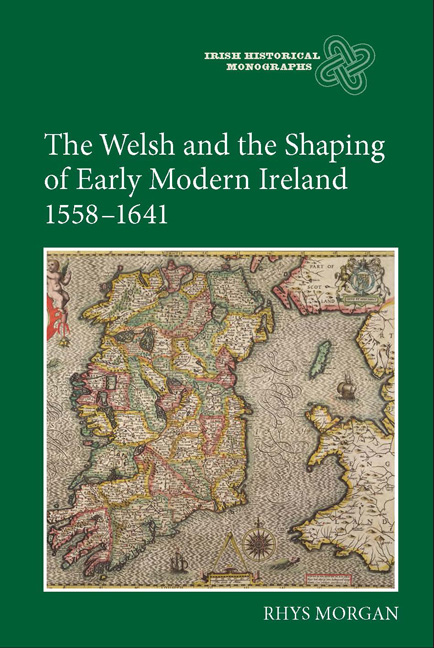Book contents
- Frontmatter
- Dedication
- Contents
- List of illustrations
- Acknowledgements
- Abbreviations
- Introduction: Locating the Welsh in Ireland and Britain during the early modern period
- Part I From soldier to settler
- Part II The New Welsh
- 4 A colonial community? Kinship and cooperation among the Welsh in Ireland, 1558–1641
- 5 A ‘ragged Welch companie’: difference and identity within the New English community
- Conclusion
- Appendices
- Bibliography
- Index
5 - A ‘ragged Welch companie’: difference and identity within the New English community
from Part II - The New Welsh
Published online by Cambridge University Press: 05 November 2014
- Frontmatter
- Dedication
- Contents
- List of illustrations
- Acknowledgements
- Abbreviations
- Introduction: Locating the Welsh in Ireland and Britain during the early modern period
- Part I From soldier to settler
- Part II The New Welsh
- 4 A colonial community? Kinship and cooperation among the Welsh in Ireland, 1558–1641
- 5 A ‘ragged Welch companie’: difference and identity within the New English community
- Conclusion
- Appendices
- Bibliography
- Index
Summary
The previous chapter challenged received opinion regarding the coherence of the New English community in Ireland by arguing that distinct Welsh networks existed within it. This chapter attempts to further question ideas about colonial unity by emphasising the importance of difference within the New English community. It begins by examining how the Welsh in Ireland were represented by their English counterparts. At the beginning of this period the Welsh in Ireland were presented by observers as a loyal and united part of the colonial community. However, ethnic and religious tensions engendered by the wars of the 1580s and 1590s heightened New English concerns about the need for cultural uniformity among soldiers and settlers. One result of this was that colonial commentators began to highlight the potentially destabilising differences that existed between the Welsh and English in Ireland, especially at lower social levels. They became increasingly concerned that such divisions might be dangerous to English government in Ireland. The Welsh came to be seen as a troubling source of difference in a colonial community that strove for unity and uniformity.
The second section of the chapter argues that Welsh migrants to Ireland developed a distinct identity, partly as a reaction to these anxieties about Welsh loyalty in the colonial community. This is primarily discussed through a close reading of the Chronicle of Ireland written during the 1590s by a Welsh cleric in Ireland, Meredith Hanmer.
- Type
- Chapter
- Information
- The Welsh and the Shaping of Early Modern Ireland, 1558–1641 , pp. 131 - 154Publisher: Boydell & BrewerPrint publication year: 2014



